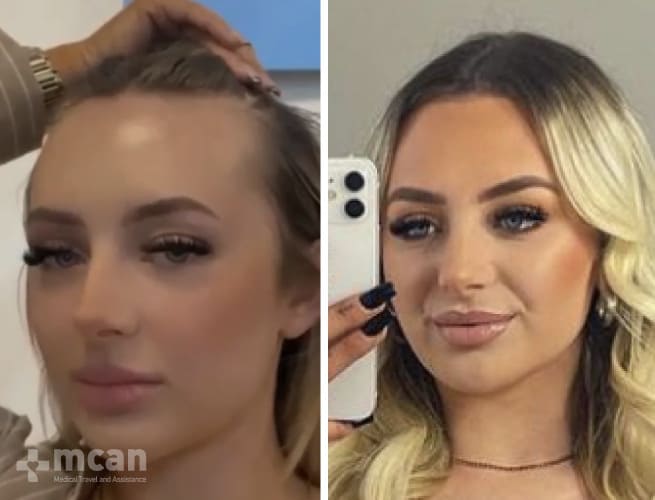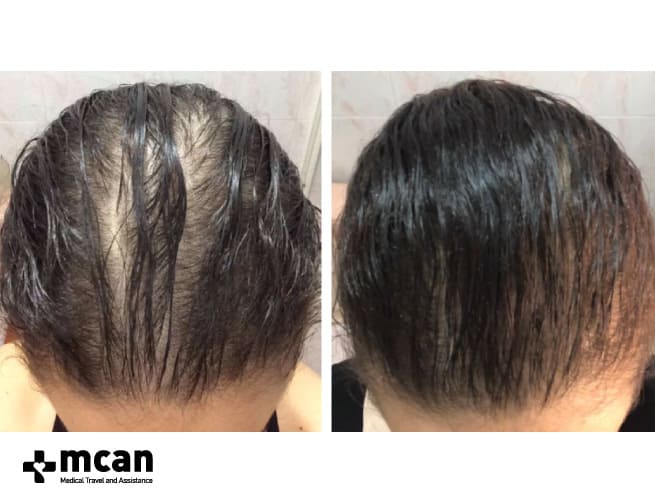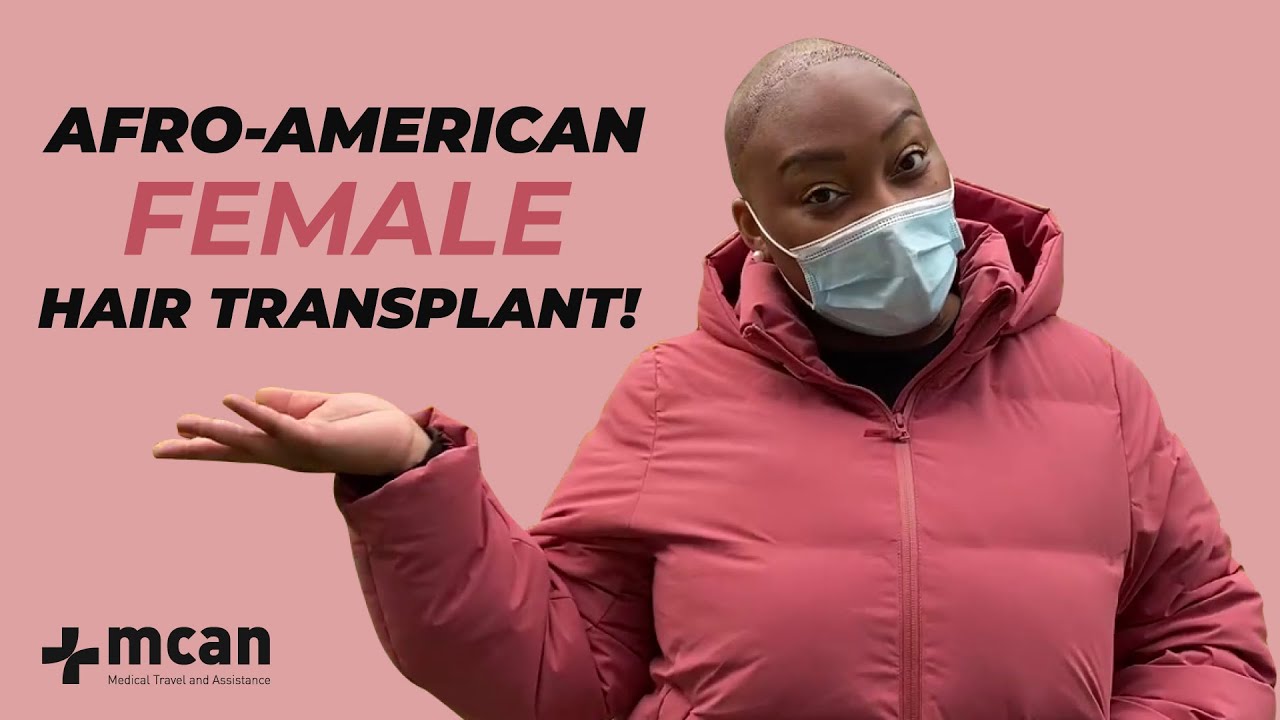Female Hair Transplant in Turkey
Hair loss in women, just like in men, can be a profoundly impactful experience, significantly affecting their self-esteem and emotional well-being. Thinning hair or baldness can create feelings of self-consciousness and loss of confidence. Women make up approximately 17.5% of the global hair transplant patient population. Furthermore, according to statistics, around 40% of women with hair loss have genetically inherited ’female pattern hair loss.’
Female Pattern Baldness, or Androgenetic Alopecia, primarily affects the top of the scalp in women. It is characterized by a widening part line, thinning on the crown, and overall diffuse hair thinning. Unlike men, the frontal hairline is typically preserved. However, there are instances where women may desire to address their hairline concerns for various reasons, such as receding hairline or asymmetry.
As most people suffering from hair loss and receding hairline prefer to visit Turkey for a hair transplant procedure, many women choose Turkey to fix their hair problems. In conclusion, solutions are not just for men but also women.
In women’s hair loss cases, it is essential to analyze the specific condition and determine its origin before deciding on a treatment plan. There are various causes of hair loss in women, and each requires a different approach to address it effectively. Knowing the origin of women’s hair loss is crucial for an accurate diagnosis and tailored treatment plan. Identifying the cause allows for targeted interventions, avoiding unnecessary treatments, and addressing underlying health issues.
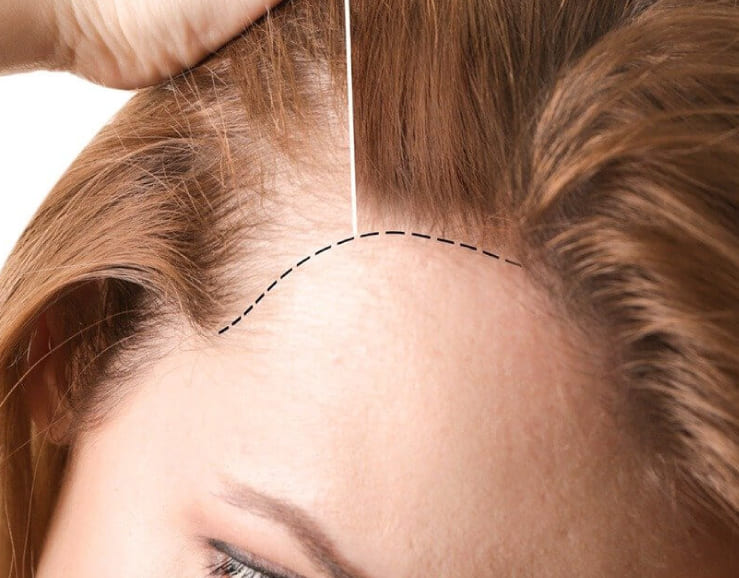
Causes of Female Hair Loss
Women can experience thinning hair or baldness due to various reasons such as hormonal imbalances, genetics, aging, or medical conditions.
Androgenetic Alopecia (Female Pattern Hair Loss): It is an inherited condition characterized by a progressive thinning and shrinking of hair. Typically, it manifests as diffuse hair thinning on the crown and upper area of the scalp. Hair transplant procedures are better suited for individuals experiencing androgenetic alopecia (genetic hair loss) or other conditions where hair follicles have permanently ceased production.
Telogen Effluvium: A temporary condition characterized by excessive shedding of hair caused by stress, illness, surgery, hormonal changes, or nutritional deficiencies. Hair transplant procedures are generally not advised for women with telogen effluvium. If a woman is facing hair loss due to telogen effluvium, seeking guidance from a dermatologist or healthcare expert is crucial to identify and treat the root cause. Once the underlying issue is addressed, hair growth should typically resume naturally, eliminating the need for a transplant.
Alopecia Areata: It is a condition where the body’s immune system unintentionally targets the hair follicles, resulting in patchy hair loss. A hair transplant procedure is not a good choice for those experiencing alopecia areata.
Hormonal Changes: Hormonal imbalances due to pregnancy, childbirth, menopause, or conditions like polycystic ovary syndrome (PCOS) can trigger hair loss.
Medical Conditions: Certain conditions like thyroid disorders, scalp infections, and skin disorders can contribute to hair loss.
Medications: Some medications used to treat specific health issues may have hair loss as a side effect.
Hairstyles and Hair Treatments: Excessive use of hair treatments, hairstyles that pull on the hair (traction alopecia), or harsh chemicals can damage hair follicles and lead to hair loss.
Nutritional Deficiencies: Inadequate intake of essential nutrients, such as iron, zinc, biotin, and vitamins, can affect hair health.
Emotional or Physical Stress: High levels of stress, whether emotional or physical, can lead to hair shedding.
Aging: As women age, the rate of hair growth may slow down, and hair may become thinner and more fragile.
Alternative Hair Loss Treatments for Women
Depending on the underlying cause and specific circumstances, there are several alternative hair loss remedies for women that can be considered.
Topical Minoxidil: Minoxidil is an over-the-counter drug that has received FDA approval and can aid in promoting hair growth and reducing hair loss. It is offered in different strengths and formulas made especially for women.
Aging: As women age, the rate of hair growth may slow down, and hair may become thinner and more fragile
Low-Level Laser Therapy (LLLT): Laser combs and helmets can stimulate hair follicles and promote hair growth. For some types of hair loss, this non-invasive treatment might work.
Platelet-Rich Plasma (PRP) Therapy: PRP involves injecting the scalp with a concentrated solution of the patient’s blood platelets. It might encourage thicker, more vigorous hair growth.
Hormonal Therapy: Hormone replacement treatment or oral contraceptives can be recommended to assist balance hormone levels and reduce hair loss in cases of hair loss caused by hormonal imbalance.
Nutritional Supplements: Supplements with vitamins, minerals, and amino acids, such as biotin, iron, and zinc, can promote healthy hair development, particularly in cases of nutritional deficiency.
Anti-Androgen Medications: Anti-androgen drugs may be used in some cases of androgenetic alopecia to prevent the effects of male hormones on hair follicles.
Scalp Treatments: Treatments for the scalp that contain substances like salicylic acid or ketoconazole can aid in controlling scalp issues that cause hair loss.
Proven Results Female Hair Transplant in Turkey Before and After
Would you like to experience the undeniable proof of successful female hair transplant with MCAN Health as you explore our extensive collection of before and after photos? These compelling images vividly showcase the remarkable transformations achieved by our patients, demonstrating significant improvements in hair density and overall appearance.
Female Hair Transplant Turkey Journey of MCAN Health’s Patients
MCAN Health strives to deliver exceptional female hair transplant surgery and outcomes, ensuring a positive experience for our patients from their initial contact until the completion of their treatment. The testimonials from our patients reflect the distinct experiences they have had in Turkey with MCAN Health.
Hear from MCAN Health’s Female Hair Transplant Patients
Female Hair Transplant Turkey Cost
Female hair transplant cost in Turkey is notably affordable compared to other countries such as the UK and the US. The competitive pricing in Turkey enables women seeking hair transplant treatments to achieve their desired results without breaking the bank. This affordability factor, coupled with the renowned expertise of Turkish medical professionals and state-of-the-art facilities, makes Turkey an attractive choice for female hair transplant procedures, attracting an increasing number of international patients seeking cost-effective solutions without compromising quality.
It’s worth mentioning that the costs can vary depending on the specific technique used for the procedure. Different techniques, such as Follicular Unit Extraction (FUE) or Direct Hair Implantation (DHI), may have other price points. On average, female hair transplant cost in Turkey ranges between 1.999€-6.500€ while it is 4.000€-20.000€ in the UK and in the US, it is between 5.000€-25.000€. Clinics in Turkey do not charge patients depending on the number of grafts numbers, unlike the UK, the US, and other European countries. Instead, the technique that is used determines the female hair transplant cost Turkey. This approach allows patients in Turkey to have greater flexibility and potentially more affordable options, making it an attractive destination for those seeking cost-effective treatments.
| Country | Price |
|---|---|
| TURKEY | 1.999€ – 6.500€ |
| UNITED KINDGOM | 4.000€ – 20.000€ |
| UNITED STATES | 5.000€ – 25.000€ |
Best Method for Female Hair Transplant
Since every case is different and patients’ expectations are unique, the best method can differ from person to person.
There are two main hair transplant methods. FUE and DHI hair transplant can both be used in hair transplant. Both ways are successful in different cases. Therefore, determining the best method is the patient hair loss condition, the donor area’s condition, and the patient’s expectations and needs.
Follicular Unit Extraction (FUE) is preferred for extensive hair loss due to its ability to harvest more follicles from a broader donor area while leaving tiny, less noticeable scars. On the other hand, Direct Hair Implantation (DHI) excels in precise hair placement, achieving natural and dense hairlines. Its minimal graft handling enhances follicle survival, and the implanter tool allows for meticulous hairline design.
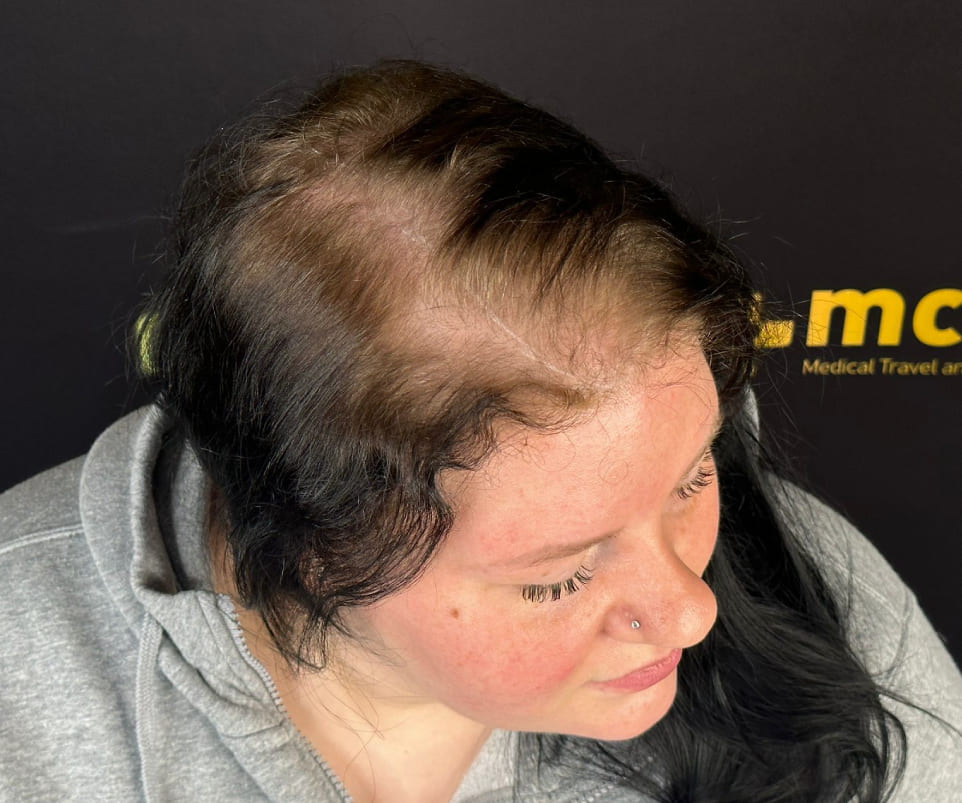
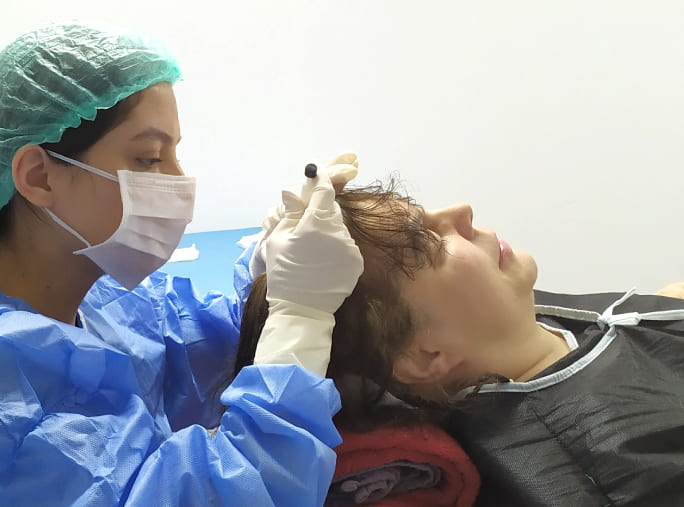
Best Female Hair Transplant in Turkey
A significant number of females suffer from hair loss due to various reasons. Thanks to the procedure is the hero for many saving both males and females from distressing situations. Turkey, the apple of the eye for many people in terms of successful hair transplant results and high in quality services with affordable prices, attracts millions of international people for hair transplant procedures. MCAN Health has been performing hair transplant procedures in various techniques, including FUE hair transplant, Sapphire hair transplant, and DHI hair transplant, since it was founded in 2015.
Hosting numerous international patients for male and female hair transplant in Istanbul, MCAN Health’s popularity comes from its well-equipped contracted clinic full of well-experienced and qualified hair transplant surgeons prioritizing the needs, desires, and comfort. At MCAN Health, the patient’s overall experience in Turkey is as essential as a smooth and successful surgery. Therefore, MCAN Health always strives for the utmost satisfaction of its patients throughout every step of their journey.
Furthermore, MCAN Health provides comprehensive packages that make female hair transplant surgery in Turkey convenient and cost-effective. These packages include airport transfers, accommodation, host, and follow-up services. As a result, patients can prioritize their recovery and thoroughly enjoy their stay in Turkey, free from any concerns or burdens. advancements in hair transplantation, and cutting-edge technology, the hair transplant
Women Hair Transplant Procedure in Turkey
Thousand of women visit MCAN Health for the best female hair transplant in Turkey. What are the steps of the female hair transplant Turkey procedure?
Consultation
During the consultation, the surgeon assesses the patient's hair loss cause, type, progression likelihood, hair thickness, expectations, age, gender, and medical history. The surgeon examines both the donor and recipient areas and determines the appropriate number of grafts required for the patient. The required preoperative tests, including HIV, Hepatitis B, and Hepatitis C screenings, are conducted, and the patient's medical history is reviewed. Patients should openly communicate their expectations to the surgeon without hesitation. MCAN's surgeons guide patients, providing realistic opinions and the most suitable hair transplant treatment. Patients should openly communicate their expectations to the surgeon without hesitation. MCAN's surgeons guide patients, providing realistic opinions and the most suitable hair transplant treatment.
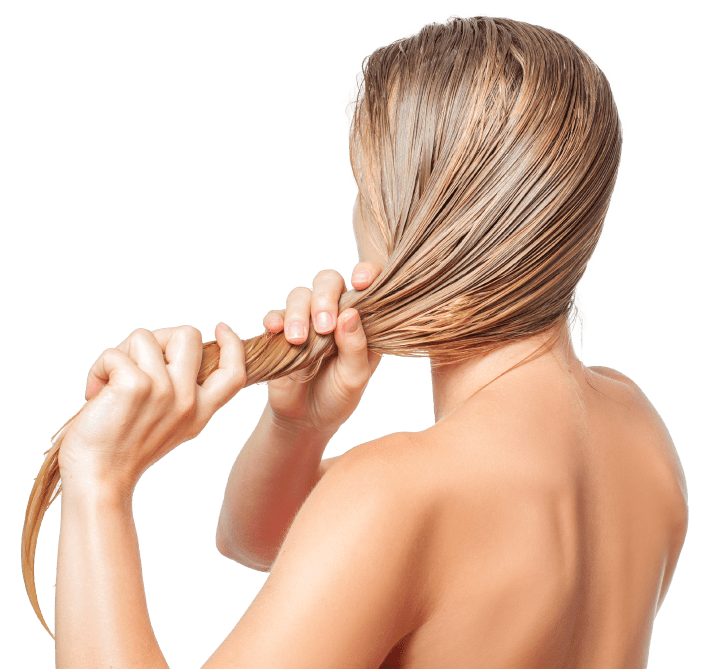
Female Hair Transplant Recovery
The recovery period after a female hair transplant Turkey procedure is important for achieving successful results. Immediately after the procedure, the scalp may be sensitive, and mild discomfort or pain can be expected. Bandages or protective dressings may be applied to the donor and recipient areas to protect the newly transplanted hair follicles. Proper care and cleaning of the scalp are essential during this time. The donor and recipient areas will heal, with the donor area's sutures or wounds gradually healing and the recipient area's scabs or crusts shedding naturally. Medications and post-operative care instructions provided by the surgeon should be followed. Activities that strain the scalp and direct sunlight exposure should be avoided. Hair shedding is normal in the initial weeks, followed by gradual hair growth from the transplanted follicles. Regular follow-up appointments with the surgeon are scheduled to monitor progress and address concerns.
Who is Eligible for a Female hair transplant?
Good candidates for female hair transplant typically have the following characteristics:
- Stable hair loss: The candidate's hair loss should be stable, meaning it is no longer progressing or worsening. Hair transplant surgery is generally not recommended for individuals with active hair loss.
- Sufficient donor hair: The candidate should have adequate healthy hair follicles in the donor area, usually the scalp's back or sides. These follicles will be transplanted to the areas of thinning or balding.
- Realistic expectations: Candidates should have realistic expectations about the results of the hair transplant procedure. While it can significantly improve, it may not restore a full head of hair to its original density.
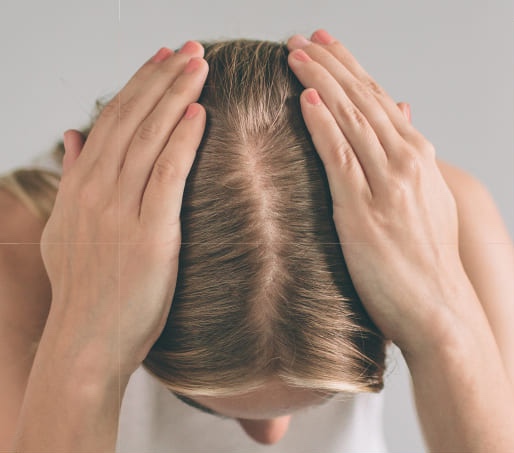
Fast Facts
| Operation Goal: | To regain lost hair back. |
|---|---|
| Duration of the Operation: | 6-8 hours, depending on the extent of the hair loss. |
| Anesthesia: | Local Anesthesia. |
| Maximum Number of Grafts: | Maximum number of grafts can be up to 5,000 grafts. |
| In/Outpatient: | Outpatient |
| Possible Side Effects: | Bleeding, bruising, swelling, discomfort, pain, and necrosis. |
Aftercare of Hair Transplant for Women
After a female hair transplant, following specific guidelines to promote proper healing and optimize the results is crucial.
- Avoid Hairdryer: Patients should avoid hair dryers following the procedure. The heat from the dryer can harm the scalp and hair follicles after the surgery. It is best to let the hair air dry. 6 months after the surgery, hair dryer can be used.
- Avoid Dyeing the Hair: Waiting a certain period before dyeing your hair after a hair transplant is generally recommended. The transplanted hair follicles need time to establish and heal in the recipient area.
FAQ

Didn’t find your question?
You can ask any questions you have regarding Female Hair Transplant in Turkey right now!
The naturalness of hair transplant results is contingent on the skill and proficiency of the hair transplant surgeon. When hair follicles are extracted from the patient's donor area, they retain their natural characteristics. Therefore, the surgeon must implant the hair at the correct angle and execute the process accurately for a natural appearance. Therefore, selecting a reputable clinic with experienced doctors is of utmost importance.
You can do whatever style you want after the initial healing phase. It is strongly recommended that during the initial healing period, patients should avoid tight hairstyles. Gradually patients can return to everyday styling as the scalp heals and transplanted hair grows.
Female hair transplants can be suitable for various types of hair loss, primarily for those experiencing androgenetic alopecia (female pattern hair loss). The procedure's effectiveness depends on factors like the type and extent of hair loss, hair texture and color, and overall health. Women with diffuse thinning on the crown and frontal scalp tend to have better outcomes. However, individuals with patchy alopecia areata or scarring alopecia might not be ideal candidates.
The final results of a female hair transplant typically become noticeable over several months. Some transplanted hair might fall out during the first weeks, but new hair growth initiates. Around 3 to 4 months after the procedure, you may observe thin and delicate hairs starting to grow. Between 6 to 9 months, there is an intermediate growth phase, where the hair becomes thicker and longer, improving the overall density. The final results are usually fully visible after 12 to 18 months following the transplant. At this point, the hair should have matured, looking thicker, healthier, and blending naturally with the rest of your hair. Being patient and following post-operative care instructions is crucial for the best possible outcomes.
The transplanted hairs with DHI are considered to be permanent, as they are taken from the donor area of the scalp, which is resistant to hair loss. The donor hair follicles are transplanted into the recipient area of the scalp, where they continue to grow and behave like natural hair.
In a female hair transplant, doctors check the scalp to find areas with healthy and stable hair follicles unaffected by hair loss. Unlike men, women usually have thinning hair all over the scalp, which makes this assessment more complicated. They consider factors like how much hair there is if it's stable, and if it resists the hormone causing hair loss. They also look at the pattern and extent of thinning to make sure taking hair from the donor area won't make it look bad. They plan for the long-term to make sure the donor's hair will stay healthy even if hair loss continues. Consulting with an experienced hair transplant doctor helps create a personalized plan for natural-looking results while keeping the donor area looking good.
Dr. Yavuz as an experienced healthcare professional and expert, has reviewed and approved the content of this page to ensure that the information provided is accurate, relevant, and aligned with the highest standards of patient care.
Published by MCAN HEALTH
Published:
Updated:
- American Hair Loss Association, “Degree of Hairloss”, https://www.americanhairloss.org/women_hair_loss/degree_of_hair_loss.html (Date of Access: 29.05.2023)
- National Library of Medicine, “Is Every Patient of Hair Loss a Candidate for Hair Transplant?—Deciding Surgical Candidacy in Pattern Hair Loss”, December 20, 2021, https://www.ncbi.nlm.nih.gov/pmc/articles/PMC8719975/ (Date of Access: 29.05.2023
